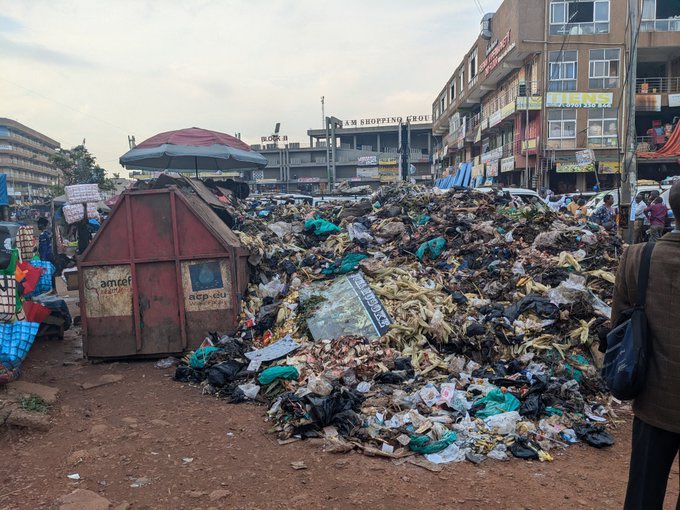The Kiteezi Landfill Tragedy has starkly exposed the glaring inefficiencies within the Kampala Capital City Authority’s (KCCA) waste management department. The incident, which occurred a few weeks ago, has left the city enveloped in an odor more offensive than that of a mortuary.
Once hailed as a “smart city,” Kampala has now fallen from grace, becoming one of the cities deemed unworthy of a visit. During Jennifer Musisi’s tenure, Kampala garnered numerous awards for its environmental management, aligning its urban agenda closely with climate change initiatives. The city was green, and the air was refreshingly cool. However, in recent years, Kampala has shifted from being a climate champion to a significant contributor to environmental degradation.
Moreover, the piles of waste overtaking city markets—Nakasero, Kalerwe, and Owino—are more than just eyesores; they are symptoms of a deeper crisis that plagues Kampala.
The city’s ongoing struggle with waste management has come under intense scrutiny. This issue transcends the mere cleanliness of public spaces; it is deeply connected to the broader and urgent challenge of climate change.
Improper waste management significantly accelerates climate change. Organic waste, which constitutes a substantial portion of Kampala’s garbage, decomposes to release methane—a greenhouse gas far more potent than carbon dioxide in trapping heat in the atmosphere. The towering garbage piles are not merely a local environmental concern; they are a direct contribution to global warming, with repercussions that extend far beyond Uganda’s borders.
Additionally, the mismanagement of waste leads to blocked drainage systems, exacerbating flooding during heavy rains—a frequent occurrence in Kampala. These floods not only disrupt daily life but also carry waste into water bodies, contaminating vital water sources for both humans and wildlife.
The health impacts are severe, with increased incidences of waterborne diseases such as cholera and typhoid fever, which disproportionately affect the most vulnerable populations, including children and the elderly.
As these waste management challenges intersect with the effects of climate change, they compound the environmental, social, and economic stresses on the city.
Kampala’s predicament is not unique; cities around the world have faced similar challenges and have implemented successful strategies that Kampala could learn from. For instance, Rwanda’s pioneering decision to ban plastic bags in 2008 has drastically reduced plastic pollution.
This bold move, coupled with stringent enforcement and strong community engagement, has turned Rwanda into one of the cleanest countries in Africa. In a similar vein, Kampala could phase out single-use plastics and promote the adoption of biodegradable alternatives.
A ban on plastic, if coupled with effective enforcement and public awareness campaigns, could substantially reduce the amount of non-biodegradable waste clogging the city’s drains and public spaces.
Looking further afield, Sweden offers an inspiring model with its waste-to-energy approach. Sweden has achieved the remarkable feat of converting over half of its waste into energy, powering homes, and heating entire districts through advanced incineration plants.
The key to Sweden’s success lies in rigorous waste segregation at the source and a robust recycling infrastructure that ensures minimal waste ends up in landfills. For Kampala, investing in waste-to-energy technology could be transformative, turning a liability into a valuable resource that provides clean energy and reduces environmental degradation.
Another example of effective waste management is San Francisco, which has set a goal of zero waste by 2025. The city has achieved impressive results through comprehensive recycling and composting programs, stringent policies on waste separation, and a strong emphasis on public education. San Francisco’s approach underscores the importance of community involvement and strict regulatory frameworks.
Kampala could adopt similar measures by rolling out community-based programs focused on the principles of reduce, reuse, and recycle. Education campaigns, particularly targeting younger generations, could instill a culture of environmental stewardship that supports long-term sustainability.
Addressing the waste crisis in Kampala will require a holistic approach that combines policy reform, community engagement, and investment in technology. One of the first steps should be the implementation of mandatory waste segregation at the household and business levels.
This initiative could be bolstered by public education campaigns that teach residents about the importance of separating organic from inorganic waste and the broader impact of their actions on the environment. Incentivizing compliance through rewards or subsidies for those who adhere to waste segregation guidelines could further enhance participation.
Additionally, investment in recycling infrastructure is critical. Establishing recycling facilities and fostering industries that utilize recycled materials could not only reduce waste but also create jobs and stimulate the economy. Public-private partnerships, supported by international donors and investors, could provide the necessary capital and expertise to develop these facilities. Strengthening policies and enforcement mechanisms is equally crucial.
The government needs to implement stricter regulations on waste disposal and ensure robust enforcement to deter illegal dumping and irresponsible waste management practices. Penalties for non-compliance, alongside rewards for communities that maintain high standards of cleanliness, could encourage more responsible behavior.
Engaging communities through initiatives such as clean-up drives, waste management workshops, and school programs can also make a significant difference. By empowering residents to take ownership of their environment, Kampala can foster a sense of collective responsibility that supports sustainable waste management practices. Community participation will be key to ensuring the longevity and success of any waste management strategy.
The waste crisis facing Kampala serves as a stark reminder of the urgent need for action. By learning from successful models around the world and implementing innovative solutions tailored to the city’s unique challenges, Kampala can mitigate the impacts of climate change and protect the health and well-being of its residents. This is not just about cleaning up the city today; it’s about safeguarding the future for generations to come. The choices made now will determine whether Kampala can transform its waste woes into a story of resilience and sustainable progress.
Do you have a story in your community or an opinion to share with us: Email us at Submit an Article









